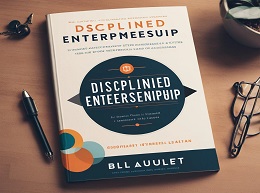The Bezos Letters: 14 Principles to Grow Your Business Like Amazon

Unveiling the Principles of Success
"The Bezos Letters" by Steve Anderson offers a unique perspective on business growth through the lens of Amazon's journey. This review delves into the 14 principles outlined in the book, providing readers with actionable insights inspired by Amazon's success and real-life examples to enhance their own business strategies.
Principle 1: Obsess Over the Customer
Amazon's relentless focus on customer satisfaction has been fundamental to its success. Subheadings like "Customer-Centricity in Action" and "Delivering WOW Experiences" explore how Amazon goes above and beyond to delight its customers. Examples of Amazon's customer-centric initiatives, such as Prime membership and one-click ordering, illustrate the power of putting the customer first and foremost in all business decisions.
Principle 2: Take Ownership of Your Company's Future
Jeff Bezos's vision and willingness to take calculated risks have been key drivers of Amazon's growth. Subheadings like "Embracing a Long-Term Vision" and "Boldness in Action" delve into Bezos's audacious goals and his willingness to invest in the future. Examples of Amazon's long-term bets, such as AWS and Kindle, showcase the importance of taking ownership of your company's future and embracing bold initiatives to drive growth.
Principle 3: Invent and Simplify
Amazon's culture of innovation and relentless pursuit of simplicity have enabled it to disrupt industries and create new market opportunities. Subheadings like "Embracing a Culture of Innovation" and "Simplicity in Design" explore how Amazon fosters a culture of experimentation and continuous improvement. Examples of Amazon's innovative products and services, such as Alexa and Amazon Go, demonstrate the power of inventing and simplifying to drive business growth.
Principle 4: Be Resourceful
Amazon's frugality and resourcefulness have allowed it to achieve more with less, enabling it to invest in areas that drive long-term value. Subheadings like "Doing More with Less" and "Maximizing Efficiency" delve into Amazon's lean operating model and its emphasis on efficiency and cost optimization. Examples of Amazon's resourceful initiatives, such as Fulfillment by Amazon (FBA) and the Marketplace, highlight the importance of being resourceful in driving business success.
Principle 5: Hire and Develop the Best
Amazon's commitment to hiring and developing top talent has been instrumental in fueling its growth and innovation. Subheadings like "Investing in Talent" and "Cultivating Leadership" explore how Amazon attracts and retains the best and brightest minds. Examples of Amazon's talent development programs, such as Leadership Principles and Career Choice, illustrate the company's dedication to nurturing a high-performing culture and developing future leaders.
Principle 6: Think Big
Amazon's willingness to think big and tackle ambitious challenges has been central to its ability to disrupt industries and drive innovation. Subheadings like "Embracing Moonshot Thinking" and "Setting Audacious Goals" delve into Amazon's bold aspirations and its willingness to pursue big ideas. Examples of Amazon's moonshot projects, such as Prime Air and Project Kuiper, showcase the importance of thinking big and pushing the boundaries of what's possible.
Principle 7: Be Agile
Amazon's agility and ability to adapt quickly to changing market dynamics have enabled it to stay ahead of the curve and maintain its competitive edge. Subheadings like "Embracing Change" and "Iterating Rapidly" explore how Amazon fosters a culture of agility and experimentation. Examples of Amazon's agile practices, such as Two-Pizza Teams and Day 1 mentality, demonstrate the importance of being agile in responding to market shifts and driving business growth.
Principle 8: Innovate on Behalf of Your Customers
Amazon's customer-centric approach to innovation has been key to its ability to anticipate and fulfill evolving customer needs. Subheadings like "Anticipating Customer Needs" and "Delivering Innovative Solutions" delve into how Amazon leverages technology and data to innovate on behalf of its customers. Examples of Amazon's customer-focused innovations, such as Amazon Prime and Alexa, illustrate the company's commitment to delivering value and convenience to its customers.
Principle 9: Earn Trust
Trust is foundational to Amazon's success, and the company works tirelessly to earn and maintain the trust of its customers, partners, and stakeholders. Subheadings like "Building Trust and Credibility" and "Demonstrating Integrity" explore how Amazon prioritizes transparency, reliability, and accountability in all its interactions. Examples of Amazon's trust-building initiatives, such as customer reviews and seller feedback, highlight the importance of earning trust in driving long-term relationships and business success.
Principle 10: Diversify Your Revenue Streams
Amazon's diverse portfolio of revenue streams has allowed it to weather economic downturns and capitalize on emerging opportunities. Subheadings like "Expanding Revenue Streams" and "Balancing Risk and Reward" explore how Amazon diversifies its revenue sources across different product categories and business lines. Examples of Amazon's diversified revenue streams, such as Amazon Web Services (AWS) and advertising, showcase the importance of diversification in mitigating risk and driving sustainable growth.
Principle 11: Focus on Results
Amazon's results-oriented culture emphasizes accountability, ownership, and a relentless pursuit of excellence. Subheadings like "Measuring What Matters" and "Driving Performance Excellence" delve into how Amazon sets clear goals and holds itself accountable for delivering results. Examples of Amazon's results-driven initiatives, such as the Flywheel Effect and the Leadership Principles, illustrate the company's focus on driving measurable outcomes and continuous improvement.
Principle 12: Think Long-Term
Amazon's long-term mindset and willingness to forego short-term gains in favor of sustainable growth have been central to its success. Subheadings like "Embracing Patience" and "Investing for the Future" explore how Amazon prioritizes long-term value creation over immediate profits. Examples of Amazon's long-term investments, such as infrastructure and technology, highlight the importance of thinking long-term in building a resilient and successful business.
Principle 13: Make High-Quality Decisions
Amazon's decision-making process emphasizes data-driven analysis, collaboration, and a commitment to excellence. Subheadings like "Data-Driven Decision Making" and "Fostering a Culture of Excellence" delve into how Amazon leverages data and expertise to make informed decisions. Examples of Amazon's high-quality decision-making processes, such as the Six-Page Narrative and the Two-Way Door Principle, showcase the importance of rigor and discipline in driving business success.
Principle 14: Be Willing to Be Misunderstood
Amazon's willingness to defy conventional wisdom and embrace controversy has been integral to its ability to innovate and disrupt industries. Subheadings like "Embracing Unconventional Thinking" and "Navigating Controversy" explore how Amazon stays true to its vision despite criticism and skepticism. Examples of Amazon's controversial decisions, such as the Fire Phone and HQ2, highlight the importance of conviction and resilience in pursuing bold ideas and driving business growth.
Applying the Principles of Amazon's Success
"The Bezos Letters" provides a comprehensive framework for business growth inspired by Amazon's journey. Through the 14 principles outlined in the book and real-life examples of Amazon's success, readers gain valuable insights and actionable strategies for elevating their own business strategies. Whether you're a startup founder, entrepreneur, or business leader, this book offers invaluable guidance for achieving sustainable growth and success in today's competitive landscape.












